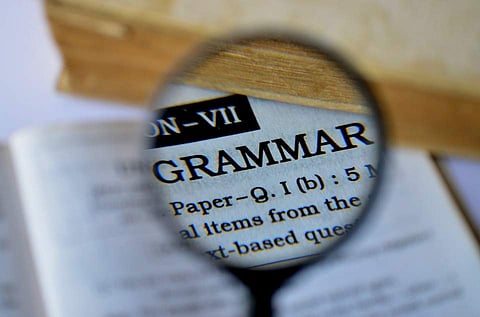

In my column last week I discussed how knowing the difference between transitive and intransitive verbs can help one use the two categories of verbs correctly.
T H Lawrence, an English language trainer and regular reader of the column, writes: “Yesterday’s column is useful to those who want to shine in their language. Additional use of prepositions always confounds the users when they realise the error. It is a good idea to discuss grammar.” A few other readers too have welcomed the idea of discussing important grammar points when required.
A reader from Vijayawada wants to know whether the verb ‘lack’ is transitive or intransitve. It can be used both transitively and intransitively.
The verb means ‘to be deficient or missing’ and ‘to be short of something’. When it is used intransitively, it is followed by the prepositions ‘in’ or ‘for’. Here are examples:
- The city has many sports enthusiasts and, fortunately, they don’t lack for activities.
- Vegetarians are no longer dismissed as cranks. Now, their dishesmake up in imagination and taste what they lack in meat.
When ‘lack’ is used transitively, it means ‘to not have enough of something that you need or want’. Here are examples:
-The candidate has academic qualifications, but lacks the skills required for the teaching job.
- I enjoyed the movie though it lacks creativity.
‘Lack of’ is a noun, meaning ‘a shortage of’ or ‘unavailability’. Look at these examples:
- There is a lack of awareness aboutenvironment pollution in Tamil Nadu.
- Students have revealed a disturbing lack of interest in learning English.
Another reader, a teacher from Pollachi, wants to know the difference between know, know of and know about. Consider this conversation between two persons:
Mr A: You don’t know Mr Modi. You have no right to criticise him.
Mr B: I know him. Almost every day I see him on TV, hear his speeches, read about him, talk about him...
Mr A: Have you had any personal experience with him? Have you ever interacted with him? You haven’t had such experience. It means you know about him, but you don’t know him.
Mr B: We all have either benefitted or been affected by Mr Modi’s policies and so we can say we know him. We can even say that we know of him.
Mr A: I don’t agree with you. We shouldn’t criticise someone if we don’t know about the person.
When we say we know someone, what we mean is that we have had personal experience with the person.
- I know the Principal of the school. I’ll be able to get a school admission for your daughter.
- The reason for the misunderstanding between me and the neighnbour is that we don’t know each other.
In the conversation between Mr A and Mr B, the latter says that it is okay to say that we know Modi though we haven’t met or interacted with him. The explanation given by Mr B is quite convincing. It is because Mr Modi is quite a well-known person and almost every day we hear about and talk about him, we can say that ‘we know him’ instead of saying ‘we know about him’. Here are more convincing examples:
-‘Do you know Narendra Modi?’ is a popular book by Nitin Agarwal.
- There are many ‘Do You Know’ books in the market.
Is there a distinct difference between know of someone and know about someone? Consider Mr X is a politician.
When we say we know of Mr X, what we mean is that we are acquainted with him and we have had personal experience with him. When we say that we know about Mr X, we mean that we have heard about the politician, but have never had any personal experience with him.What is the meaning of the expression ‘not that I know of? It is an expression used while speaking. It is used when we want to convey that we think something is not true, although we are not sure as we do not know all the facts.
- Mr A: Have John and Mary paid the full amount?
- Mr B: Not that I know of, but I’ll check with the secretary and let you know.
( Albert P Rayan is an ELT resource person and a Professor of English )
